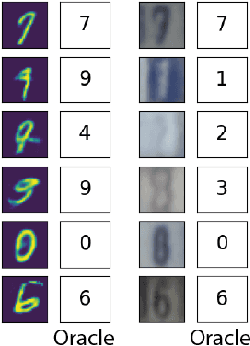Douglas McCloskey
Multimodal Variational Autoencoders for Semi-Supervised Learning: In Defense of Product-of-Experts
Jan 18, 2021



Abstract:Multimodal generative models should be able to learn a meaningful latent representation that enables a coherent joint generation of all modalities (e.g., images and text). Many applications also require the ability to accurately sample modalities conditioned on observations of a subset of the modalities. Often not all modalities may be observed for all training data points, so semi-supervised learning should be possible. In this study, we evaluate a family of product-of-experts (PoE) based variational autoencoders that have these desired properties. We include a novel PoE based architecture and training procedure. An empirical evaluation shows that the PoE based models can outperform an additive mixture-of-experts (MoE) approach. Our experiments support the intuition that PoE models are more suited for a conjunctive combination of modalities while MoEs are more suited for a disjunctive fusion.
 Add to Chrome
Add to Chrome Add to Firefox
Add to Firefox Add to Edge
Add to Edge